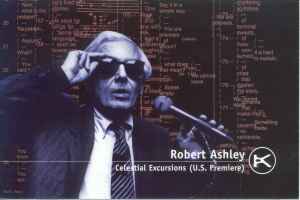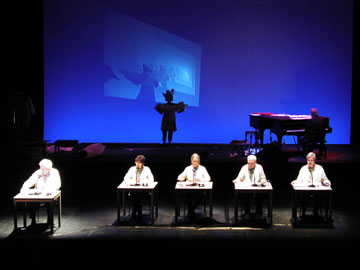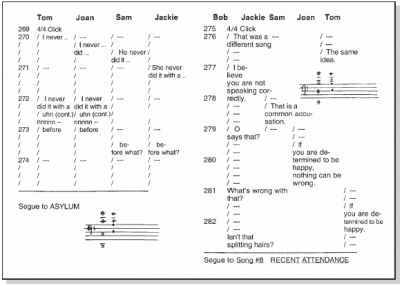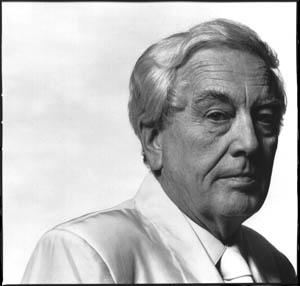 |
Celestial Excursions deals with a human condition that troubles us almost as much as death - old age. The source material is based on the sometimes aimless, unfocused and incoherent converstations of old people.
The general impression of Celestial Excursions is more than that of beautiful music, and clever poetry. It's an affirmation of the human condition. It gives the listener a more positive and compassionate perspective of the elderly. Through all of their broken thoughts, disconnected timelines, anxieties and fear, they are experienced through this work with wisdom and sensitivity, charm and humor, beauty and love.
In the program notes Robert Ashley writes:
The fear is that we won't go gently or abruptly into that good night. We will hang on in the endurance trials of old age, forever rehearsing in the early morning twilight, fortified by a few hours of faulty sleep, the plot or why there is no plot, the explanations, the why, the lists, the old grievances, never to be settled now, the stories never told or passed on, the interruptions, the terrifying proportions, everything larger than it is known to be, distorted in the mirror, and again and again.The Opera is scored for five singers. The performers for the New York production were Sam Ashley, Thomas Bruckner, Jacqueline Humbert, Joan La Barbara, and Robert Ashley. Instrumental players were "Blue" Gene Tyranny on piano, and Robert Ashley and Tom Hamilton on electronic orchestra. There was a silent character, a dancer, performed and choreographed by Joan Jonas. The opera has three acts performed without intermission, separated by periods of silence.
Old people are interesting because they have no future. The future is what to eat for breakfast or where did I leave my shoes. Everything else is in the past. Is this understandable? Reading Faulkner at seventy-two made me wonder what I could possibly have understood when I read the same story at twenty. The reason is, it takes one to know one.
So, sometimes, old people break the rules. Especially the rules of conversation and being together. They break the rules, because, for one reason or another (illness, anger, damage, enough of that, whatever), the rules no longer apply for them. They are alone. Sometimes they are sad. Sometimes they are desperate. Mostly they are brave. Mostly they have given up on the promises of religion--life after death, immortality, etc. Mostly they are concerned with dignity. Living with dignity. And dying with dignity.
But they are still obliged, as human beings, to make sounds. They are obliged to speak, whether or not anyone is listening.
 |
Robert Ashley's part was the lead. The other four singers were a chorus, who sometimes joined with him harmonically or in counterpoint. The singing style ranged from unpitched straight spoken words, through monotonically droning speech, to chantlike sing-song. The voices were sometimes processed with echo, reverb, and pitch shifting. The sound system was artfully balanced four channel surround.
The composition employed great variety in the use of the five voices. Sometimes all sang in unison, sometimes they sang the same words with common rhythm but in harmony, sometimes they sang in counterpoint, sometimes canonically, and sometimes they sang multiple parts simultaneously. There were solos, duets, trios, and quartets; all in a continuous flow. The cleverness of Ashley's compositional craft work with musical form reminded me several times of Mozart's The Marriage of Figaro.
 |
The electronic orchestra played accompaning music that was restrained and mostly consonant. The dominant sound texture was rhythmic and plunky, like a giant African thumb piano. There were also themes of water sounds, often dripping, and wind like machines fading in and out from time to time to tie sections together. "Blue" Gene Tyranny's piano music was very sparse, adding interest to the sound texture while never dominating or distracting. There were some very rich and lush rhythmic and harmonic textures when the voices sounded more insturments than singers. Many times I found myself tapping my foot to the music, like I would at a jazz performance.
Robert Ashley is a poet; a master of the English language. His poetry recreates common speech, often about trivial and unimportant subjects. Somehow the words, through rhythm, repetition, juxtaposition and other artistic devices, end up being brilliant and profound. In this respect, Robert Ashley is very much like Bob Dylan. But he supports his poetry with more than a blues band. Ashley's chorus and electronic orchestra takes the poetry beyond the realm of the song, adding facinating complexity and richness.
 |
Stylistically, Celestial Excursions seems to me very much related to the first opera, Montiverdi's Orfeo. There is a small chorus and simple orchestration. The vocal style is rhythmic, and the singing is not athletic. Celestial Excursions is opera, back to basics; opera minus 400 years of show business - but still entertaining. There is no focus on elaborate and expensive sets. There is no huge cast.
Structurally, it is much like the music of Mozart. Ashley's music is beautifully crafted; one unified composition built of sections and phrases each which could stand alone, but when put together each reinforces and enhances the rest.
 |
Celestial Excursions is rare in contemporary art in that is has a message, and it is communicated confidently, forcefully, unambiguously and unapologetically. That message is "The River Deepens [as it flows into the Ocean]". That Ashley created this work at age 73 only strengthens the message.
While this performance was wonderful, an intermission between the second and the third acts would have been appreciated. This music is quite complex and requires a great deal from the listener. Also, the chairs at The Kitchen aren't very comfortable and they are too close together. I for one could have used a break.
The performances are being recorded on separate tracks which will be used as source material for a CD to be released in the future. We look forward to this.
Photos and score example courtesy of Lovely Music, http://www.lovely.com


